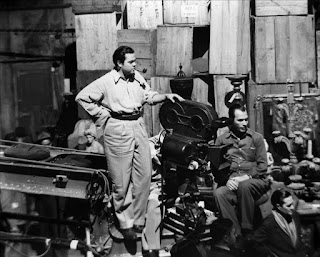One is never wrong if they call Citizen Kane the greatest American film of all time.
Unfortunately,
this safety net has in fact come to work against the film in recent years. Many
people coming to the film for the first time are so overburdened with
expectations concerning the picture’s sizeable reputation that their first
viewing inevitably leaves them both disappointed and rather curious what all
the fuss was about to begin with. Others resist labeling Citizen Kane ‘the greatest’ for other, more obvious motivations:
They want to be different and buck the convention wisdom.
Neither
condition applies to me.
I
first encountered Citizen Kane in a
high school film class and I found its perspective, wherein a newspaper
reporter interviews several characters about Kane and the narrative of the
picture leaps between time periods in an almost disjointed fashion, completely
enthralling. For me, the richness of the film’s themes, its technical
achievements and its overall artistic vision have not dulled with time, either.
This is quite simply the greatest American film ever made, no matter what
criteria one is asked to consider, and it will remain such, I believe for
eternity.
Indeed,
there are so many angles one can come at when discussing Citizen Kane—a testament, I believe, to its greatness—that one
almost does not know where to begin. There are its many technical achievements,
in which set design, costuming and makeup reached hitherto unforeseen heights
in film. There is the cinematography. Never before had light and shadow been
used so effectively, actors positioned in such crucial ways and cameras positioned
in such strange and wonderful places (Orson Welles famously cut the floor out
of some sets to shoot up and at his actors from their feet to make them appear
larger than life).
However,
the construction of the film’s narrative and the underlying themes that
narrative contains are where I believe Citizen
Kane is at its greatest.
Orson
Welles, a man who needs no real introduction to contemporary readers, for
better and worse—mostly worse, if you know anything about Welles—was at the
height of his powers when he made Citizen
Kane and the choices he makes as a storyteller are inspired. I have no
evidence Wells read William Faulkner or James Joyce, but the notion the
conventional narrative underwent a serious revision in the 1930s and 40s should
be apparent to even the most casual reader of American and world literature
from that time period. Furthermore,
Welles in his infamous “War of the Worlds” broadcast had already demonstrated
during the 1930s that he had a penchant for turning the conventional narrative
on its head through the innovative use of established mediums.
His
application of this in Citizen Kane
is clear in that he takes the traditional film noir narrative of a mystery in
need of solving (in this case about Kane’s last words), fatalism and trust and
betrayal and enlarges the genre to tackle nothing less than the entirety of the
American dream and what it means to gain and lose things (people, power, love,
adoration, hate and prestige). In a film so about narrative, it is telling we
never hear from Kane himself. Rather, he is a corpse from the very first frame
of the film and instead we hear from those who knew him at his best and his
worst, as the narrative leaps here and there and provides sharp and soft shards
of a man’s life, who by his own account could have been a great man, but was
not.
And
yet, for all the cinematic bells and whistles (and what a movie this is JUST to
watch, even on mute), for all its tricks of camera and flashes of brilliance,
this is at its heart a film about people and their failure to interact with
another, to love one another and to live to meaningful lives. All of the
characters in Citizen Kane are
haunted ghosts, empty reflections of a former “greatness” that when peeled away
turns out to be far more prosaic and ordinary than we first believed. Kane’s
longtime sidekick still remembers a nameless woman he never spoke to but
glimpsed on a New York pier, Kane’s best friend just wanted to write an honest
review of Kane’s wife because he could not remember how to do anything honest.
These
are small, simple acts (or non-acts) and yet they all had more impact than Kane’s
failed gubernatorial bid or the Second World War on all of those involved. That
is because in the end, Citizen Kane
is about the roads not taken or the decisions made or not made and what each of
those moment renders in the years that follow. What is a life but the fragments
of where it touched other people? Kane’s physic interior can be guessed at, but
never known. What can be known, both by him and all the other characters, is the
decisions they all made and how those decisions created their lives and
formed them into the people they became. Thus, Kane’s “Rosebud” was a sleigh
ride never taken, a life of complete ordinariness in Colorado wilds that was
never possible after his mother sent him East with his millions.
That
he seemed willing to trade all the subsequent moments, all the subsequent
decisions and outcomes for a chance at that lost life is the tragic nostalgia at the heart
of Citizen Kane’s power as a film.
For who among us believes every path
we chose was the correct one? That all of those roads not taken were
truly unworthy of exploration?





